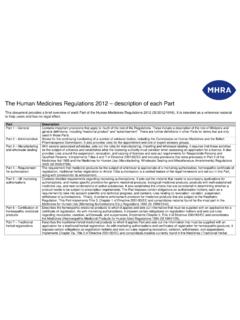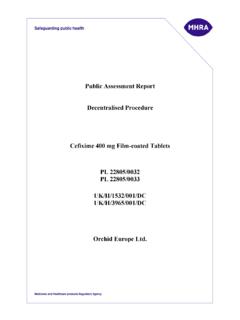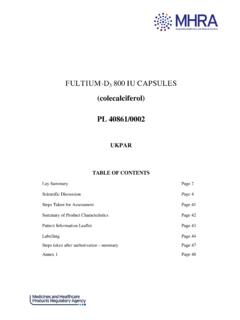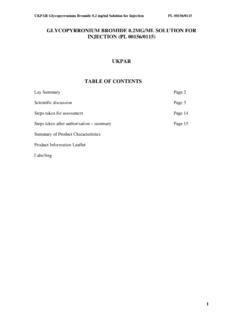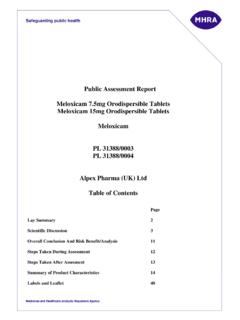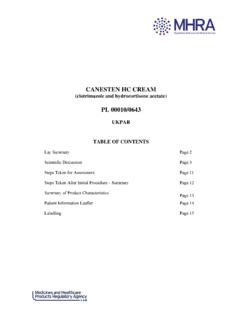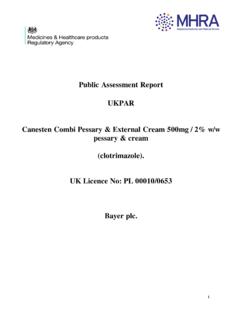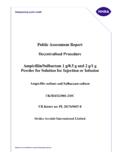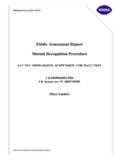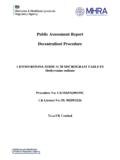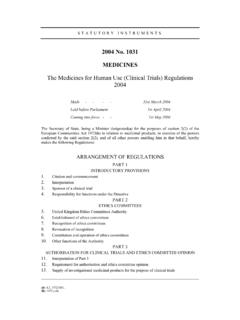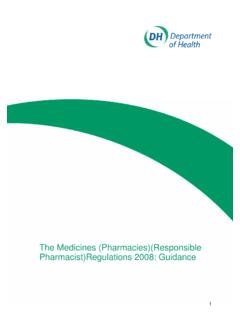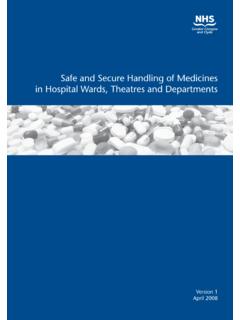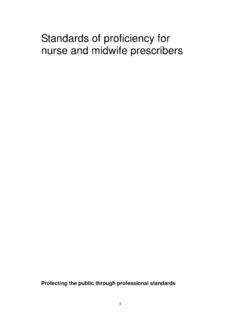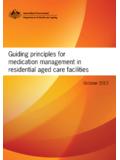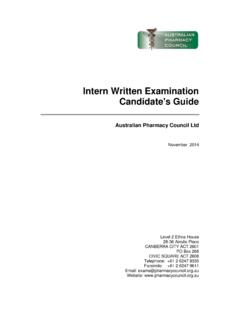Transcription of ANNEX A REVIEW OF EU MEDICINES LEGISLATION …
1 ANNEX A REVIEW OF EU MEDICINES LEGISLATION - PROPOSALS FOR implementation existing LEGISLATION relating to MEDICINES for human use The manufacture, marketing and distribution of medicinal products for human use in the European Community is governed by Directive 2001/83/EC ( the 2001 Directive ). This Directive consolidates a number of earlier EC directives (in particular Directive 65/65 EEC) and sets out a comprehensive Community code for MEDICINES for human use. The key requirement is that no product maybe placed on the market in any Member State of the Community, unless it has a marketing authorisation granted by a national competent authority under the provisions of the Directive, or a Community-wide authorisation granted by the European Commission under Regulation (EC) No.
2 2309/93. The Directive sets out rules governing how such authorisations are granted and the basis on which they may be suspended, varied or revoked. The Directive also governs: the manufacture, wholesale distribution and advertising of medicinal products; labelling and patient information leaflets; pharmacovigilance (the monitoring of drug safety); classification of medicinal products ( into products which are subject to medical prescription and those which are not); and supervision and sanctions (for example, provisions regarding inspections by national authorities). The Directive is also supported by guidance issued by the European Commission in The Rules governing medicinal products in the European Union ( ). In particular- Volume 2A contains the Notice to Applicants which provides guidance on the procedures for MAs and on the content of the dossier of data which must accompany each application for authorisation Volume 9 contains guidance on pharmacovigilance, including the reporting of ADRs to MEDICINES The 2001 Directive is implemented in the UK by various pieces of LEGISLATION .
3 In particular- The MEDICINES for Human Use (Marketing Authorisations Etc) Regulations 1994 ( 1994/3144) ( the MA Regulations ), as amended, implement the provisions of the Directive relating to the grant, variation, suspension and revocation of MAs and the obligations of MAHs (including obligations relating to pharmacovigilance, labelling and package leaflets) Sections 8 to 24, and 28 to 30, of the MEDICINES Act 1968, and various orders and regulations under those provisions, including the MEDICINES (Standard Provisions for Licences and Certificates) Regulations 1971 ( 1971/972), implement the provisions of the Directive in relation to manufacturing and wholesale distribution 1/88 Sections 108 to 126 provide for the enforcement of the Act and the 1994 Regulations, and thereby implement the provisions of the Directive relating to supervision and sanctions The MEDICINES (Advertising) Regulations 1994 ( 1994/1932) and the MEDICINES (Monitoring of Advertising) Regulations 1994 ( 1994/1933) implement the provisions of the Directive relating to advertising The interpretation and operation of these is explained in various guidance notes prepared by the MHRA.
4 For manufacturers and wholesalers, the relevant Guidance notes are 5, 6 and 13. Those covering advertising, labelling and disease awareness campaigns are 23 and 24, and 25 and 26 respectively. Guidance notes relating to MAs can be found on the MHRA s web-site at: The amendments made by Directive 2004/27/EC will affect the procedures followed by the MHRA. The following sections of the consultation indicate the proposed changes to procedure, as well as the MHRA s interpretation of the effect of the new provisions. Directive 2004/27/EC Article 1 of Directive 2004/27/EC sets out the amendments to the 2001 Directive. The amendments, and the proposals for implementation , are explained in more detail below. Summary of changes to LEGISLATION In order to implement the Directive, the relevant provisions of UK LEGISLATION would be amended.
5 Marketing authorisations The amendments made by Directive 2004/27/EC in relation to MAs including requirements for labelling, package leaflets and pharmacovigilance, are contained in Article 1(1) to (12) and (16) to (30), (40) to (53), (73) to (76), (79), (80), (83) and (86). We propose that these provisions would be implemented by amending the MEDICINES for Human Use (Marketing Authorisations etc) Regulations 1994 ( the MA Regulations ). The amending regulations would be made under section 2(2) of the European Communities Act 1972. The MA Regulations do not set out all the obligations on MAs in detail. Instead, the Regulations provide that authorisations must be granted, varied, suspended or revoked in accordance with the relevant Community provisions and that MAHs must comply with the obligations imposed on them by those provisions.
6 To ascertain the precise obligations, the MHRA and the MAH must refer to the European LEGISLATION itself. We propose to continue that approach to the drafting of UK LEGISLATION relating to MAs, rather than copying out the detail of the provisions, or seeking to elaborate the provisions in detail in UK LEGISLATION . The definition of relevant Community provisions would simply be amended to include a reference to the amendments made 2/88 by Directive 2004/27/EC. We would be grateful for your views on whether you agree with this approach. A number of other changes are however proposed; for example creating new criminal offences for the breach of new obligations. Manufacturing, wholesale distribution The amendments made by Directive 2004/27/EC in relation to manufacturing, wholesale dealing and are contained in Article 1(32) to (39) and (55) to (60), (77) and (78).
7 We propose that these provisions be implemented by making regulations under section 2(2) of the European Communities Act 1972 to amend the relevant provisions of the MEDICINES Act 1968. Regulations would also be made to amend the MEDICINES (Standard Provisions for Licences and Certificates) Regulations 1971 ( 1971/972). The changes to implement the Directive would be combined with the other amendments proposed in ANNEX D. Advertising The amendments made by Directive 2004/27/EC in relation to advertising are contained in Article 1(61) to (72). We propose to implement these provisions by amending the MEDICINES (Advertising) Regulations 1994. Homoeopathic Regulations Article 1(12) to (15), (31), (51), (60), (71) and (81) of Directive 2004/27/EC make amendments to the 2001 Directive in relation to homoeopathic medicinal products.
8 We proposes to implement these provisions by amending the MEDICINES (Homoeopathic Medicinal Products for Human Use) Regulations 1994 ( 1994/105). Other changes Other miscellaneous changes would be implemented by regulations under section 2(2) of the European Communities Act 1972; The new Article 5(3) and (4) of the 2001 Directive, inserted by Article 1(4) of Directive 2004/27/EC, which requires Member States to lay down provisions to ensure that authorisation holders, manufacturers and health professionals are exempt from civil liability for the consequences of using an unauthorised MEDICINES , or using an authorised medicine outside its licensed indications, where that use is authorised or recommended by the competent authority in the event of a suspected or confirmed spread of pathogenic agents, toxins, chemical agents or nuclear radiation Article 1(87)
9 Which inserts a new Article 127b of the 2001 Directive, requiring Member States to ensure that appropriate collection systems are in place for unused or expired MEDICINES Format of description of provisions 3/88 The provisions have been arranged to follow the life-cycle of the product, from the revised definition of a medicinal product, through the rules governing MA applications and post-licensing activities to manufacture, importation and wholesale distribution. Finally, there are separate sections covering the application of the revised provisions to homoeopathic products, herbal products, and parallel imported products. For each provision, the Article of the 2001 Directive which is amended or inserted is provided, together with the paragraph of Article 1 of Directive 2004/27/EC which makes the amendment.
10 CHANGES TO DIRECTIVE 2001/83/EC (as amended by DIRECTIVE 2004/27/EC) You may find it useful to refer to the consolidated version of the 2001 Directive, as amended by Directive 2004/27/EC. The document is published by the European Commission and is available at Articles 1(2) and 2(2) - Definition of a medicinal product (Articles 1(1) and 1(2) of amending Directive 2004/27/EC) Summary The definition of a medicinal product in Article 1(2) of Directive 2001/83 EC has been changed. The new definition states that to be a medicine a product must be: (i) Any substance or combination of substances presented as having properties for treating or preventing disease in human beings; or (ii) Any substance or combination of substances which may be used in or administered to human beings either with a view to restoring, correcting or modifying physiological functions by exerting a pharmacological, immunological or metabolic action, or to making a medical diagnosis.
